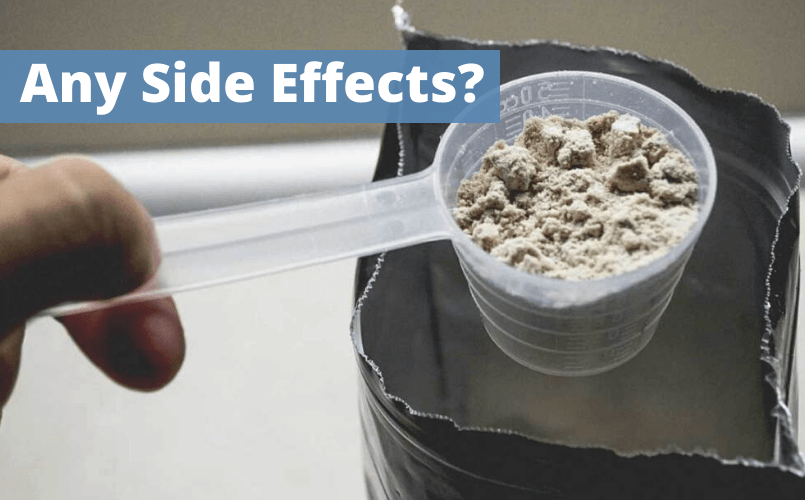Are you trying to break free from whey protein powder? Tired of feeling bloated, gassy, and wondering why you have to suffer through it? Plant-based is the way to go!
Rice protein powder is more than just a bland source of carbohydrates. In fact, it can be just as effective as whey protein. Moreover, it can also be more nutritious when compared to whey.
It is also ideal for anyone who is lactose intolerant or practicing a plant-based lifestyle.
This ultimate source of protein is better than whey in more ways than one. But we’ll get to that later.
We’ve compiled 11 of the best rice protein powders in the market to help you choose and make the switch.
Review Summary:
- 1. NAKED Brown Rice Protein Powder – Overall Best Choice
- 2. Nutricost Unflavored
- 3. Zen Principle
- 4. Growing Naturals
- 5. NutriBiotic
- 6. Garden of Life RAW
- 7. Veggie Elite
- 8. My Protein
- 9. Now Foods
- 10. NutriCargo
- 11. BulkSupplements
Table of Contents
Best Rice Protein Powder (Products Rated for 2024)
Not everyone is aware that rice protein is among the best protein sources out there. You could opt for pure rice protein or choose one that presents a little more nutrition. That said, any which way you look at it, it’s clear that it can beat whey any day. Especially since it doesn’t cause any adverse side-effects like bloating or cramps.
Take a look at 11 of the best powders on the market today:
1. NAKED – #1 Organic Brown Rice Protein Powder
If you’re looking for something low-carb yet high reward, NAKED rice protein is the ideal choice for you. It packs 25 grams of pure protein per serving and only yields 4 grams of carbs. If you’re looking for something that is pure and untouched, it is something you should get your hands on quickly.
Here’s why you’ll like it:
One Ingredient Rules Them All – it is as good as it gets. If you want something that packs protein and none of the bad stuff, you’re looking at the right product. There are no confusing ingredients to look at because it’s made purely out of organic sprouted brown rice protein powder.
- High protein yield per serving (25 grams per serving)
- Low carbohydrate content
- Gluten-free
- Contains more than just protein intake
- Has calcium, iron, and magnesium
- 100% Pure and vegan
- 4.9 g BCAAs per serving
- A bit grainy
- Quite expensive
Summary: This product is as pure as it gets. It’s made of 100% pure brown rice and packs a high protein yield per serving. Moreover, you’ll appreciate that it contains a healthy dose of BCAAs and nutrients like calcium, magnesium and iron. However, the texture on its own is quite grainy and it does get quite expensive.
.
2. Nutricost Unflavored – Good Option (Affordable)
This Nutricost is highly popular and in high demand because of how affordable it is despite its decent protein per serving yield. One great thing about the company is they control every part of the manufacturing process from start to finish.
This means your rice is planted, harvested, and turned into protein powder by the Nutricost company. This removes any risk of tampering and changes to the manufacturing process caused by third parties.
Here’s why you’ll like it:
120 Day Money Back Guarantee – if you’re feeling like your Nutricost isn’t really working for you, you can return it for a free refund NO QUESTIONS ASKED. Yes, it’s that easy! It’s one of the most comprehensive and helpful returns and refund guarantees in the market.
- USDA-certified Organic
- Made in a GMP-compliant facility
- 20 grams of protein per serving
- Affordable
- Vitamins and minerals
- Quite bitter on its own
- Does not mix very well
Summary: If you’re looking for something that is affordable, reliable and comes with a great money-back guarantee, Nutricost’s unflavored is the best choice for you. It provides a high protein yield per serving and a complete aac profile that guarantees nutrition. However, it does taste quite bitter when mixed with milk and water and it does not mix well, so it would be better added to your blended drinks.
.
3. Zen Principle – Highest Protein Yield Per Serving
Another great organic rice protein powder for anyone who wants something that is purely made out of sprouted organic protein is the Zen Principle. It contains a whopping 26 grams of protein per serving and is USDA-certified organic, so you’re sure that you’re putting nothing more than pure protein into your body.
Here’s why you’ll like it:
Simple and Effective – whether you’re trying to build muscle or lose weight, it is ideal for many reasons. For one, it’s all organic and doesn’t contain any additives. Moreover, it’s vegan-approved and highly effective for a myriad of uses.
- Only contains one ingredient
- Reasonably priced
- Easily mixable
- Effective and simple
- USDA-certified organic
- Not available in flavored options
Summary: If you’re looking for something you can just grab quickly and mix with water or milk, it is ideal. However, if you’re sensitive to tastes, you might not be a fan of its earthy flavor. It doesn’t come in flavored options, so it’s better added into other beverages, shakes or smoothies. Despite that, it packs plenty of protein per serving and is all-organic and completely pure.
.
4. Growing Naturals – Best Tasting
This Growing Naturals is naturally sweetened with Stevia. This makes it better tasting compared to other pure options.
That said, you’ll enjoy its all-organic ingredient list, which only contains two impressive ingredients: 24 grams of pure organic sprouted protein and Stevia. Is there anything more attractive than an ingredient list you can easily understand?
Here’s why you’ll like it:
Well-recognized – there’s nothing more attractive than a product that is widely covered in numerous reviews. Although this product is certainly not the best, I can certainly say that it presents some great benefits on top of being a reliable and reputable company.
- Naturally sweetened
- Short ingredient list
- Low caloric count
- Low carbohydrate content
- Some people may find the stevia taste overpowering
Summary: It is best for anyone who likes the taste of Stevia. However, if you aren’t a fan of it, you may feel averted to the flavor. That said, it is made by a highly respected company and it contains all-natural ingredients. It’s also ideal if you’re looking for something low-carb and low-calorie.
.
5. NutriBiotic Rice Protein- Best for Sensitive Stomachs
This NutriBiotic is ideal for anyone who is prone to digestive distress. It features a lower protein yield per serving. However, it is diet-friendly and features a complete aac profile, and is well-reviewed by many enthusiasts. It features a low caloric count, and it’s also low in carbohydrates, so you know it won’t interfere with your diet.
Here’s why you’ll like it:
Simple and Reliable – it comes in smaller doses. It’s easily digestible because of the enzymatical processing of the brown rice protein, which makes it suitable for people with sensitive stomachs. This also means you’re less likely to feel bloated or gassy.
- Easy to digest
- Low caloric count
- Low in carbohydrates
- Enzymatically processed
- Contains your daily BCAAs
- Low protein yield per serving
- A bit too basic
Summary: It isn’t better or worse than other protein powders on this list. In fact, it’s simply a bit too basic for some especially since it only contains 13 grams of complete protein per serving. That said, it is easily digestible and it does contain your daily BCAA requirement. Moreover, it’s also reasonably priced so it’s an ideal option for beginners.
.
6. Garden of Life RAW – Best for Losing Weight
This Garden of Life RAW plant-based protein powder is advertised as best for those who are trying to shed a couple of those extra pounds. It is made with a blend of 13 organic sprouted ingredients that are USDA-certified organic, non-GMO, and vegan-friendly.
Moreover, it contains clinically studied ingredients that work together to help you burn fat as quickly as possible.
Here’s why you’ll like it:
Formulated for Weight Loss – it contains a blend of best organic and all-natural ingredients that work hand in hand to effectively help you lose those extra pounds you can’t seem to shake off. These ingredients include Svetol Extract from Green Coffee Beans, Chromium created from Raw Food, and Organic Cinnamon that helps you burn stubborn fat, maintain healthy blood sugar levels, boost your energy, focus, and clarity and lose weight.
- Boosts your energy
- Boosts your mental clarity
- Maintains healthy blood sugar levels
- Contains a complete aac profile
- Tastes great
- Contains digestive enzymes
- Contains sodium
Summary: It has since been acquired by Nestle. Some changes to the packaging and overall quality and formula have been made, but it still remains to be one of the most effective complete powders out there for weight loss. However, it does contain sodium as a preservative with the new formula which is something that isn’t likely to fall within a health buff’s good graces.
.
7. Veggie Protein Elite – Best for Building Lean Muscle Mass
This Veggie Elite is ideal for anyone who wants to maintain a healthy weight while developing lean muscle mass. It’s an ideal blend of organic brown rice and yellow peas.
This means you’re getting full nutrition with all the benefits.
It is also ideal for anyone who wants to boost their immune system. This bioactive vegetable blend contains antibodies that keep your body healthy and well-protected.
Here’s why you’ll like it:
Optimum Health and Nutrition – the presence of antibodies not only helps with your immune system but is believed to help with healthy digestive and intestinal functions as well. This helps you digest more easily. Moreover, it also contains a complete amino acid profile from organic rice and pea rice proteins that help you gain lean muscle mass while the complete protein content helps you lose unwanted fat.
- Contains antibodies
- Digests easily
- The packaging needs improvement
Summary: One thing I am not keen on is the packaging. I’m not a fan of resealable packaging because of how cheap and unsafe it is. That said, this product contains an ideal blend of pea and rice which works hand in hand to deliver optimum nutrition with all the benefits. It’s ideal if you’re looking for something well-priced and highly beneficial, you’ve found it.
.
8. My Protein – Best for Athletes
This 100% vegan brown rice protein powder comes in three flavor options and two size options. This gives you enough choices if you want to be more adventurous. Moreover, it has an 80% plant-protein content which makes it ideal for anyone who likes to work and play hard. Athletes, weightlifters, and serious bodybuilders will benefit greatly from this high-quality protein blend source.
Here’s why you’ll like it:
Designed for those Who Like to Push Hard – It packs 24 grams of protein per serving. Moreover, it also contains a rich aminos that guarantees you’re getting your daily BCAAs for building muscle and helping you power through intense workouts.
- Low-fat content
- Low sugar content
- Ideal for strict diets
- Vegan and vegetarian approved
- Does not mix well
- Grainy texture
- Does not taste good on its own
Summary: You may have a bit of trouble if you’re trying to drink unflavored and on its own. It’s better blended into a complicated smoothie or added to your food. That said, it does boast a low fat and sugar content. Furthermore, it has a high protein yield per serving and is rich in amino acids which makes it ideal for any serious athlete.
.
9. Now Foods Sports Sprouted
This Now Foods Sports is trusted by athletes in any sport. It is free from steroids, allergens and comes unflavored and pure. Moreover, it also has an 80% protein content, which helps build muscle mass and helps you power through strenuous workouts and daily drills.
Here’s why you’ll like it:
All-Natural – this non-GMO and purely vegan is ideal for anyone who has problems with allergens. It is manufactured in a strictly allergen-free facility and contains nothing but pure, unflavored.
- The complete amino acid profile
- No allergens
- vegan -friendly
- Unflavored
- Mixes easily
- Not ideal for weight loss
- Does not taste very good on its own
Summary: Contrary to popular belief, any stomach distress caused by this product is likely the effect of drinking it straight and on its own. The taste is not very pleasant and despite what you may think, you’re likely to run into the bathroom if you don’t mix it into other beverages or food. However, it is safe for athletic use and contains a high protein yield per serving.
.
10. NutriCargo
To be honest, there isn’t much information on this NutriCargo product that you’ll find online. However, this organic vegan brown rice protein powder does contain nothing more than organic brown rice. This is ideal if you want something no-nonsense and completely pure. You’ll also appreciate the eye-catching resealable packaging and affordable price on this product.
Here’s why you’ll like it:
All-Natural No-Fuss – this product contains one ingredient only: brown rice protein. You’re getting purely product with a rice amino acid profile and nothing more. So if you’re conscious about what you’re putting into your body, this product is a good first choice.
- Affordable
- Short ingredient list
- No additives
- All-natural
- Not much information online
Summary: There’s not much I can say for this product except it’s made purely of brown rice. It doesn’t contain any additives. However, the lack of information and reviews about this product can be alarming to some. If you’re worried, best to consult your doctor.
.
11. BulkSupplements – Best Budget
BulkSupplements gives you the cheapest clean and pure organic powder on this list. Despite its affordability, the brand is also highly recognized and is quite reliable as well. It’s available in what I can comfortably call “sampler” packs starting at 100 grams, so it’s ideal if you want something temporary, or something long-term that won’t break the bank.
Here’s why you’ll like it:
Helps Rebuild Your Muscles – it gives off a high enough protein yield per serving that you don’t have to worry about hitting the gym too hard. This means it helps your muscles rebuild after a particularly challenging workout session.
- Free from allergens
- Bioavailable protein source
- Helps with muscle regeneration
- Versatile
- Affordable
- Easily digestible
- Chalky texture
Summary: Like many other protein powders, you’d best use this one mixed into other beverages or food. Luckily, it’s highly versatile which allows you to use it when baking, cooking or blended into smoothies. Moreover, it’s affordable, easily digestible and helps with effective muscle regeneration.
.
Who Can Benefit from Rice Protein?
Generally speaking, anyone who wants to get an extra dose of protein can benefit from taking it. But you’re more likely to reap its full benefits if you’re part of a few key groups with specialized diets, partake in rigorous physical activity, and more.
Take a closer look at those key groups below:
- Athletes and Serious Gym Enthusiasts
- If you play sports or participate in weightlifting and bodybuilding, you’re more likely to have more than an average amount of daily physical activity. This also means your body is more strained and is likely to need more nourishment to replenish your health. Rice protein is a great source of protein that is known to help with muscle recovery. Moreover, this is ideal if you want to slow the effects of a, particularly demanding workout.
Vegans and Vegetarians
- If you’re trying to add more protein to your diet by using protein powders, it is a highly effective and nourishing source of protein. It is just as effective as whey, which is derived from animals. Moreover, rice protein is hypoallergenic and completely safe for vegan and vegetarian diets. Furthermore, very rarely do rice protein powders include artificial additives, so you’re getting an all-natural source of protein and added nutrition.
- People Who are Following a Weight Loss Diet
- Weight loss is one of the most popular reasons why people opt for a high protein diet. This helps curb your appetite and provides your body with the healthiest form of meal replacement while filling you up on essential protein that is just as effective as meat protein, hemp protein, coconut protein, almond protein, and soy growth protein.
- Anyone Who Wants to Eat Clean
- If you’re trying to prioritize your health by eating clean, a blend of rice and pea protein is the ultimate natural and raw vegan protein source. That is, of course, if you choose an all-organic. Usually, I’d rather opt for an unflavored flavor and add flavor to it myself, so I know exactly what goes into my protein smoothies, but there are also plenty of naturally flavored protein powders. Opt for a fruit flavor such as strawberry or a more classic vanilla bean.
Are There Any Side Effects?
Technically, rice protein alone does not cause any adverse side effects. However, there have been a few cases where customers have come forward complaining of feeling bloated and suffering from dehydration.
While these are more likely isolated cases, you should still practice caution when taking any protein powder. Make sure you’re drinking enough liquids and that you aren’t overdosing on your protein powder, which could cause serious health issues like kidney failure.
Moreover, you cannot discount the fact that you might be suffering from an allergic reaction. Make sure you review the ingredients carefully to be sure that you aren’t allergic to anything before buying in bulk or taking any kind of supplement.
Summary: It is generally safe. However, it is still best to err on the side of caution. Make sure you aren’t allergic to any of the ingredients in your preferred protein powder and make sure you’re not taking too much of it daily. Not only is this harmful to your health, but you’re likely to reap negative effects instead of its benefits.
Is Rice Protein Better Than Whey?
But let’s just get this out of the way right off the bat: There is no definitive answer one way or the other to this question since both protein and whey are essential in a post-workout recovery diet. The next question is how to choose the right protein to supplement a diet that emphasizes lean proteins, as we do in our daily eating plan. Whey and Rice Protein Sunwarrior Classic. We consume a third of our total protein in our post-workout meal, most of which is whey protein because it’s easily digested and absorbed. They are broken down by the body’s rapid activation of protein synthesis (as opposed to the slow degradation process of protein), which stimulates cell renewal and repair.
Because of this rapid response, it is the most fast-acting of all protein sources (think of it as providing a little extra fuel during your workout to help you out). Whey proteins have a short half-life in the body (it’s absorbed and utilized within 30 minutes after ingestion) and typically last for only about 2-3 hours before being reabsorbed by the kidneys. It is water-soluble and is bound to water in the body, so it is not very stable and therefore stored in body fat.
Rice Protein Powder vs Whey
The two most common proteins that are used for making protein powder are whey and casein. But if you’re really looking for high-quality protein powder, you should get something like rice protein powder instead. There are a number of things that make rice protein powder unique and make it ideal for high-quality protein powders. For one, you can find it at any type of health food store or even online.
Some people have a problem with rice protein powder because of the taste. But, if you’re willing to pay for quality, you can find a rice protein powder that tastes exactly like whey protein powder. Rice protein powder also helps to reduce unwanted fat from the body. Now, you might be wondering whether you can even try rice protein powder. If you want to find out, you should know that you should drink about 2 scoops of rice protein.
Does Rice Protein Taste Good?
Rice protein is extremely good for weight management, it’s also very beneficial for hair growth, skin elasticity, and muscle building. All it takes is just a quick look at the benefits of rice protein for any bodybuilding enthusiast to understand the immense benefits rice protein has over animal protein. Rice protein powder or powder that has more than 50% rice protein can boost muscle building as it is very high in protein. Also, it provides a greater amount of calcium and magnesium as compared to other animal proteins.
What are the Different Uses of Rice Protein? Rice protein powder comes in three basic types: powder, smoothie, and gel. All types of rice protein come in different properties and benefits. So let’s take a look at the benefits of each type of rice protein powder.
Can Rice Protein Help Build Muscle?
2 tbsp of this healthy snack will provide you with 12 grams of protein. 1.5 grams of carbs and a good source of fat. Brown Rice. Brown rice is a lower glycemic index food which means it won’t cause blood sugar to spike or plummet. Your body breaks down brown rice slowly because it’s digested at a slower pace than white rice. This is good news for athletes who have to deal with the metabolic effects of consuming high-glycemic foods like white rice.
User Reviews, What are Customers Saying?
There are many options in the market, and the general consensus is that rice protein powder is not only generally great tasting, but it’s also highly nutritious. Most rice protein powders you’ll encounter on the market are filled with more than just your daily dose of protein and essential amino acids.
You’ll find choices that promote good health and a wide variety of sources that are not only good for your health but are great for your physique as well.
To put it simply, one must never rush into a purchase. Here are some of the best tips I’ve compiled from colleagues and loyal rice protein customers:
- It is important to choose the right type of protein – contrary to popular belief, and it’s not all just the same rice protein. You may choose from a pure, unblended powder that mostly contains just rice protein and your daily amino acid requirements, or you could choose a blend of different protein sources like pea and brown rice, which pack more nutrients and vitamins per serving.
- Make sure you aren’t allergic to anything – a common issue people have with hypoallergenic products is that sometimes it contains ingredients that they are, in fact, allergic to. For example, you might be allergic to rice, so it would be best to opt away from those protein types just to be safe.
- Make sure you choose something that tastes good – in case you’re someone who doesn’t have the time to constantly prepare complex meals, shakes, or smoothies for your protein powders, it’s important that you choose a powder that mixes well and tastes good with milk or water alone. Moreover, the same can be said for your different uses. If you plan on cooking with it, it will make sense to have something that would not leave a chocolate taste in your soup.
- Make sure you have enough protein per serving – in general, rice protein contains around 15-20 grams of protein per serving. This is a fairly good amount considering it usually comes with more nutrients, minerals, and vitamins. If you’re getting a product that has a bit less protein yield, it might be compensated with other nutrients such as calcium, vitamin C, and so on. Moreover, you should make sure your protein powder contains a complete amino acid profile for your daily BCAAs.
Summary: There are many kinds of rice protein powders in the market. Some are better in some aspects compared to other brands. However, it’s important to make sure you’re comfortable with the overall nutrition you’re getting from your powder. It’s also important to choose something that tastes good so you have something to look forward to each day.
Frequently Asked Questions
We’ve taken a look at numerous frequently asked questions regarding rice protein. Below, we’re answering some of the most pressing and important questions customers like you are asking and are eager to learn.
Is Rice Protein Better Than Pea Protein?
Not necessarily. Rice and pea protein actually go hand in hand. You’d see better effects if you take a blend of rice and pea protein daily. That said, both protein sources do have varying benefits. Most of them complement each other nicely, which is why they’re better together instead of being put in competition with each other.
Can Rice Protein Powder Cause Bloating?
Generally, no rice protein does not cause any adverse side effects, and this includes bloating. Unlike whey protein shake, which is notorious for causing gastric distress, rice protein is generally not associated with stomach discomfort. However, there are very few cases wherein you might experience bloating. This is very common if you are allergic to any ingredient in your protein powder.
Is Vegan Protein Powder Healthy?
Yes. But only when consumed in moderation. Best Vegan protein powders are understandably sourced from protein that comes underground. Because of this, they often come with traces of heavy metals from the soil.
You should be fine if you consume protein powders moderately. Moreover, there are also some negative side effects to overdosing on any protein powder, so it’s always a good practice to be careful.
What Can I Stack Rice Protein Powder With?
Generally, there are many options. However, two of the most popular choices are Rice protein with creatine and caffeine for athletic users and rice protein with vitamin B12 and omega acids for vegans and vegetarians. Of course, it would depend on your needs. But let’s take a closer look at why these two stacks are the most popular and how they work:
- For Athletes: Rice Protein + Creatine + Caffeine
- Unlike regular users, athletes commonly burn through protein quickly because of how demanding their workouts are. This includes weightlifters and bodybuilders as well. Daily workouts and drills are incredibly taxing and demanding on your body and mind. This is why adding creatine and caffeine to your daily protein mix is incredibly important. Creatine is known for helping rebuild muscles effectively, which delays the effects of your workout and prevents you from getting tired easily. Caffeine, on the other hand, helps boost your mental clarity, focus, and gives you a jolt of energy for days when you just need an extra push.
- For Vegans: Rice Protein + Vitamin B12 + Omega Fatty Acids
- Vegans are at high risk of developing nutrient deficiency when it comes to specific nutrients. This is why it’s important to load up on your protein sources. Yes, it is possible to get protein on a vegan diet. However, it becomes increasingly difficult to load up on protein on a daily basis. This is where rice protein comes in handy. Vitamin B12 and Omega fatty acids are also some of the more common nutrients that you need to stock up on but might have difficulty getting due to your diet.
Why Do Bodybuilders Prefer Rice?
Bodybuilders prefer rice as a staple in their diet for several compelling reasons, rooted in the intricate interplay between nutrition, energy metabolism, and muscle development. Firstly, rice serves as an exemplary source of complex carbohydrates, predominantly in the form of amylose and amylopectin. These carbohydrates offer a sustained release of glucose into the bloodstream, providing a steady and protracted supply of energy. This characteristic is especially advantageous for bodybuilders engaged in rigorous training sessions, as it helps maintain glycogen stores in muscles and liver, preventing premature fatigue and ensuring sustained performance.
Moreover, rice is lauded for its low fat content, a crucial factor for bodybuilders aiming to maintain a lean physique while optimizing muscle mass. The absence of excessive fats allows individuals to regulate their caloric intake more precisely, fostering a favorable environment for muscle growth and definition. Additionally, rice is naturally gluten-free, making it suitable for those with dietary sensitivities or allergies, further broadening its appeal among bodybuilders.
Beyond macronutrients, rice boasts a commendable micronutrient profile. It is a rich source of essential minerals such as magnesium and phosphorus, vital for enzymatic reactions and bone health, respectively. Furthermore, rice provides a moderate amount of protein, contributing to the overall protein intake necessary for muscle repair and synthesis.
In conclusion, the preference for rice among bodybuilders is intricately tied to its role as a complex carbohydrate powerhouse, facilitating sustained energy release, its low fat content aiding in body composition goals, and its micronutrient profile supporting overall health and muscle function. This dietary choice reflects a nuanced understanding of nutritional science and underscores the meticulous approach bodybuilders take to optimize their performance and physique.
Which Protein Powder is Better, Brown Rice or Pea?
Determining which protein powder is better, brown rice or pea, depends on various factors including individual dietary preferences, nutritional needs, and health considerations.
Brown rice protein powder and pea protein powder are both plant-based protein sources, suitable for vegetarians, vegans, and individuals with dairy or other allergies. Each type of protein powder offers unique characteristics and benefits.
Brown rice protein powder is derived from brown rice, undergoing a process to isolate the protein from the carbohydrate and fiber components. It is hypoallergenic and easily digestible, making it suitable for individuals with sensitive digestive systems. Brown rice protein is also rich in essential amino acids, although it may be slightly lower in lysine compared to animal-based proteins or pea protein. However, combining brown rice protein with other plant-based protein sources can help balance amino acid profiles.
On the other hand, pea protein powder is extracted from yellow peas, which are naturally high in protein. Pea protein is a complete protein source, containing all nine essential amino acids necessary for human health. It is particularly high in branched-chain amino acids (BCAAs), such as leucine, isoleucine, and valine, which play crucial roles in muscle protein synthesis and recovery. Additionally, pea protein is rich in lysine, an amino acid that may be deficient in some plant-based protein sources like rice protein.
In terms of digestibility, both brown rice and pea protein powders are generally well-tolerated by most individuals. However, some people may experience digestive discomfort, such as bloating or gas, particularly when consuming larger quantities of pea protein due to its higher fiber content.
When comparing nutritional content, both brown rice and pea protein powders offer similar protein concentrations, typically ranging from 15 to 25 grams of protein per serving. However, pea protein tends to have slightly higher protein content per serving compared to brown rice protein.
Ultimately, the choice between brown rice and pea protein powder depends on individual preferences and dietary needs. Some people may prefer the taste or texture of one over the other, while others may consider factors such as allergen sensitivity or amino acid profile.
It’s important to note that neither brown rice nor pea protein powder is inherently superior to the other. Both can be valuable additions to a balanced diet, providing a convenient and versatile source of plant-based protein. Individuals should choose the protein powder that aligns with their nutritional goals, taste preferences, and any specific dietary requirements or restrictions they may have.
Final Words
Contrary to popular belief, rice protein is not just a source of carbohydrates. When used properly, it presents a great source of added nutrition and daily protein for anyone who would like to take a break from whey or soy protein.
You might be worried about its efficiency when it comes to muscle-building or losing weight. But let me assure you that rice protein can be just as effective—if not more, than whey protein.
.
Just take a look at the products listed above. All of these rice protein powders are high in protein and nutrition. What’s more, they don’t cause bloating or any adverse side effects.
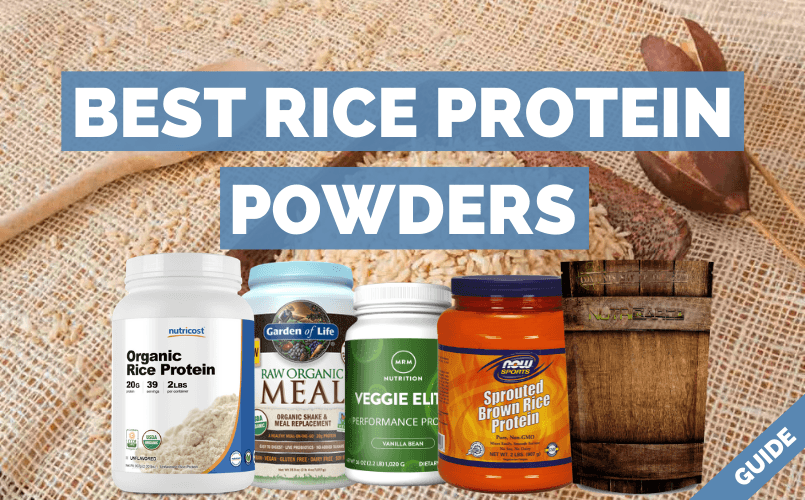
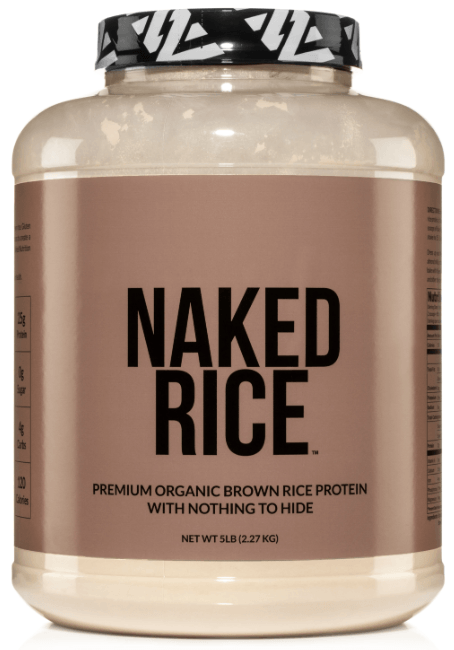
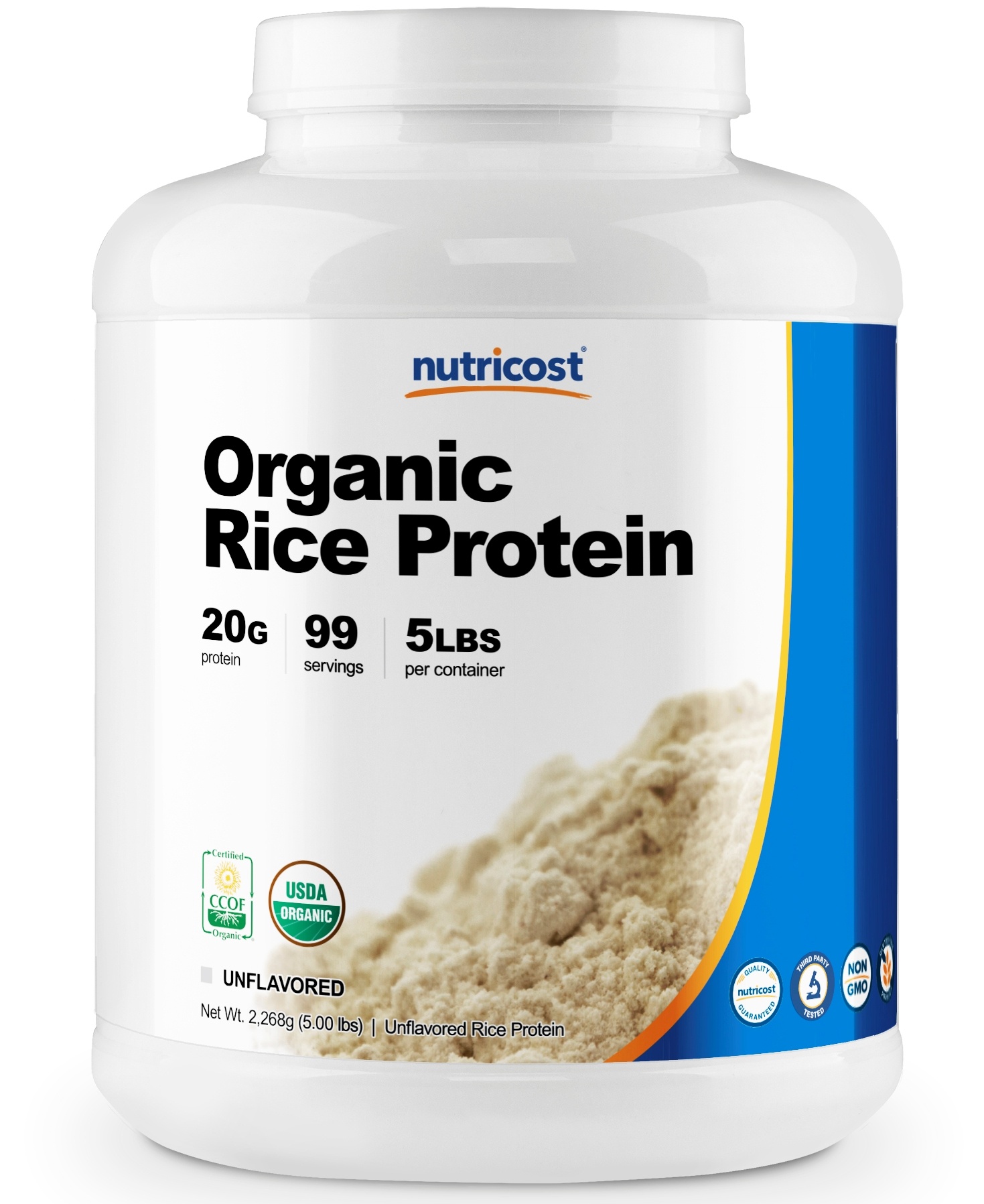
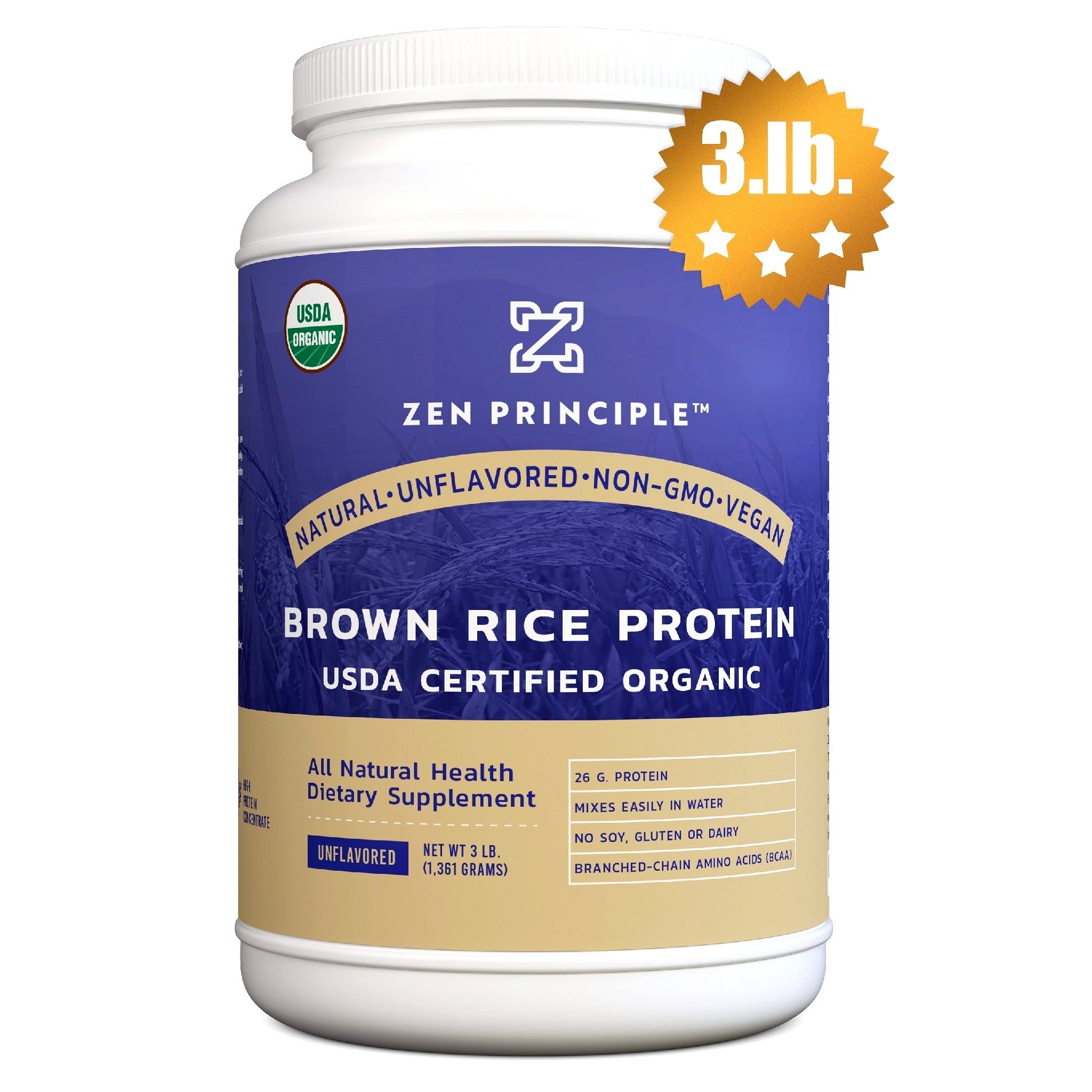
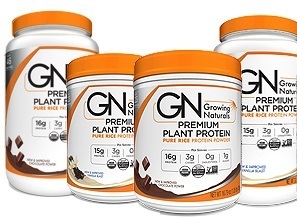
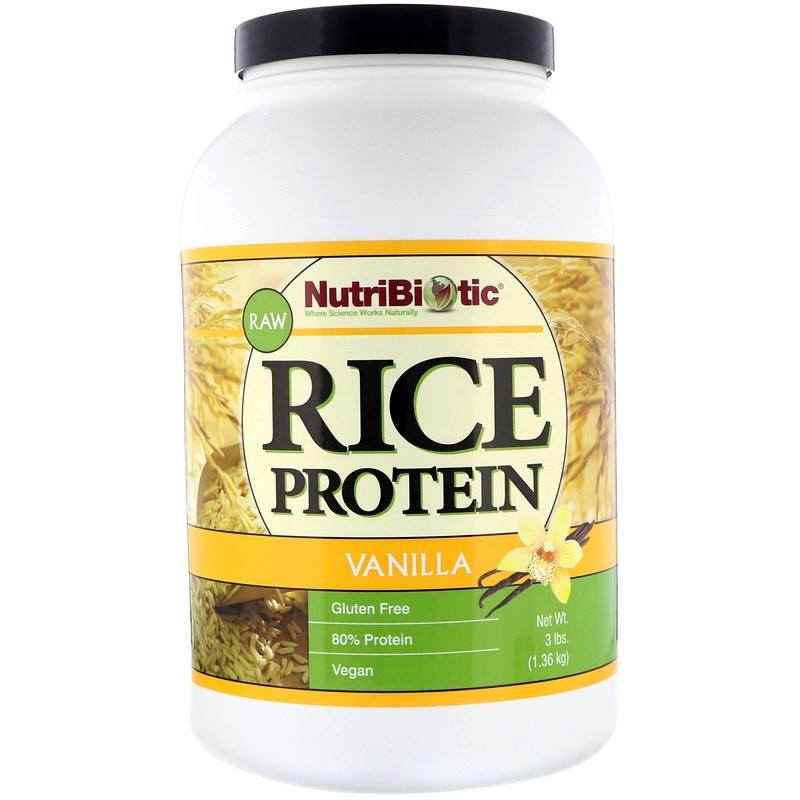
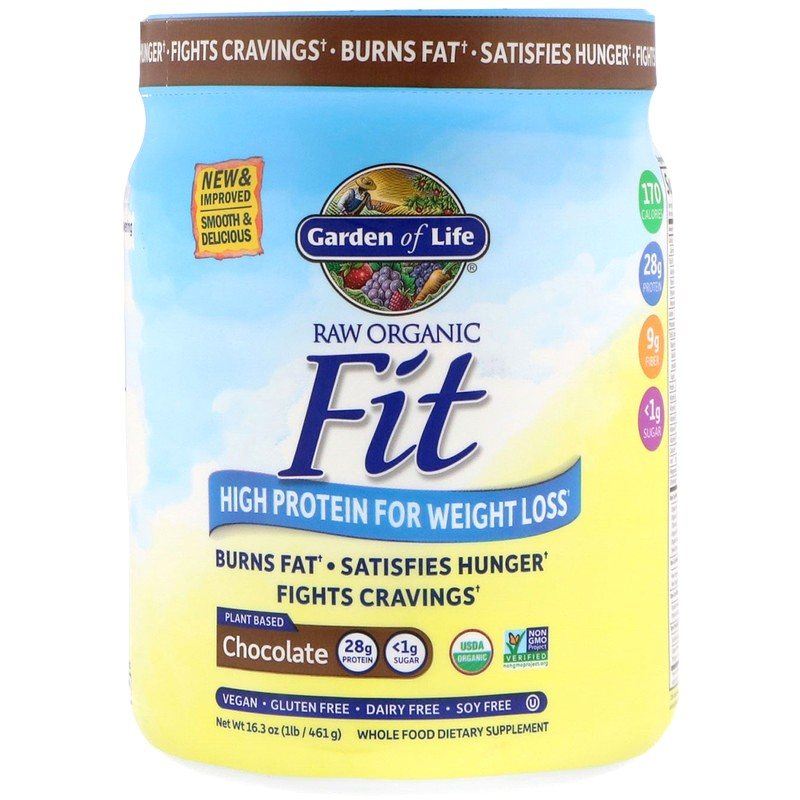
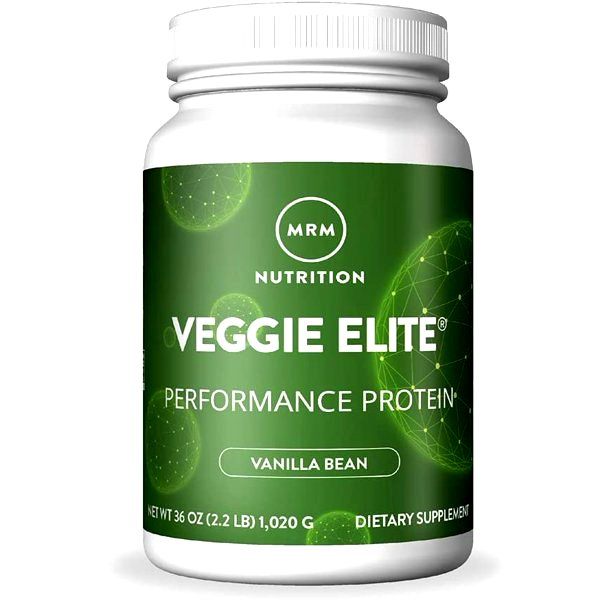
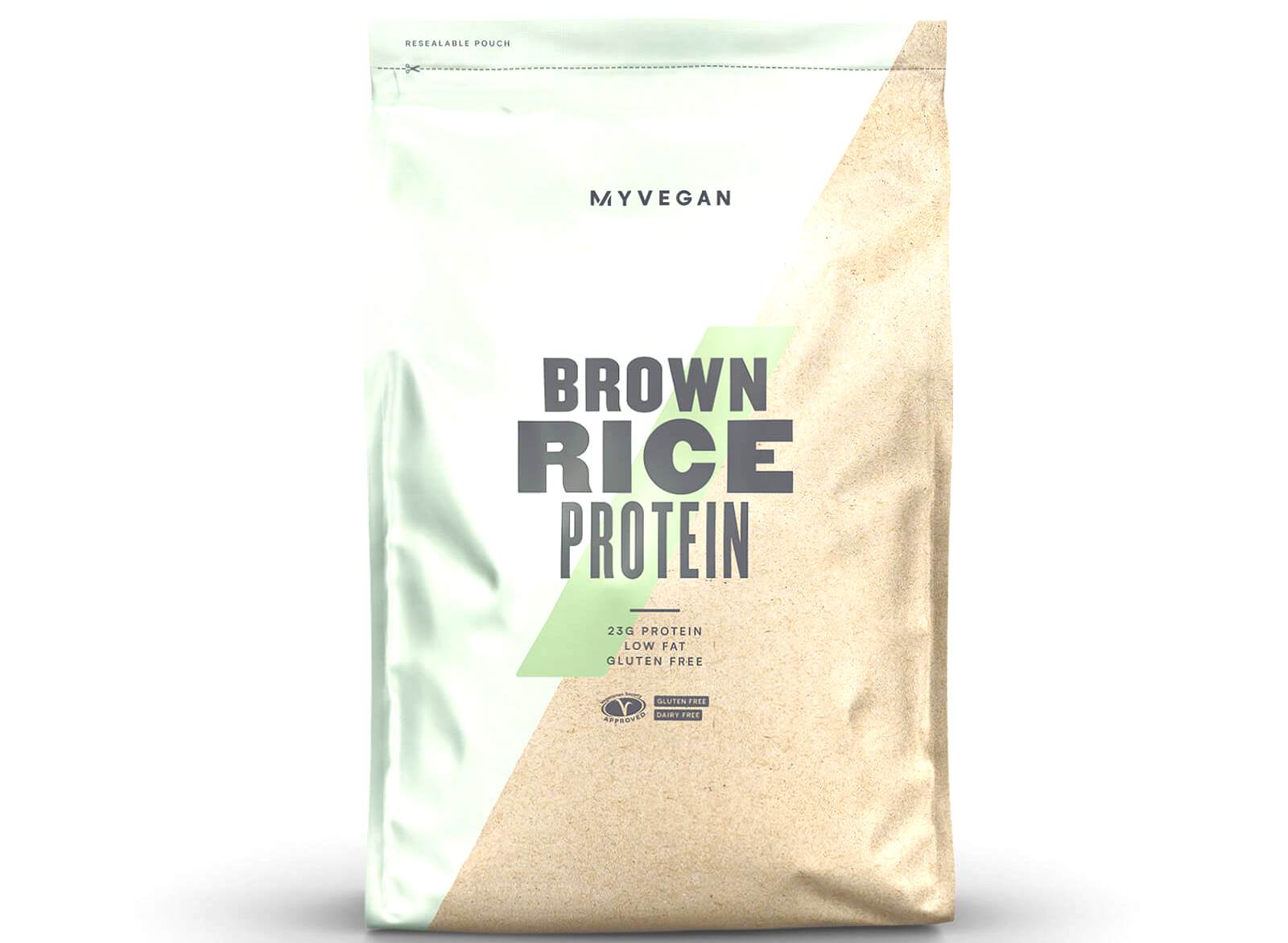
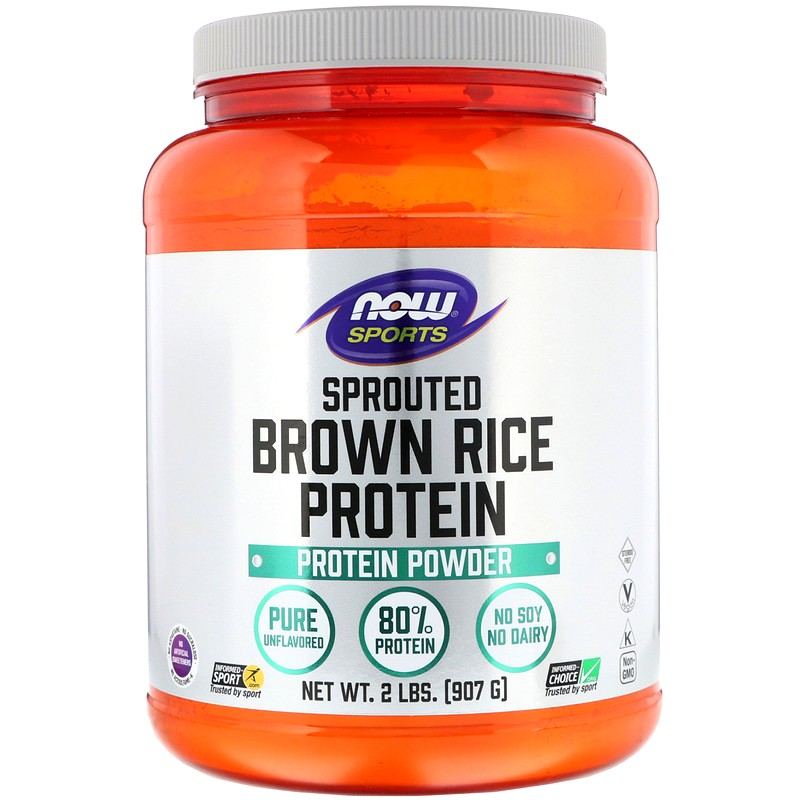
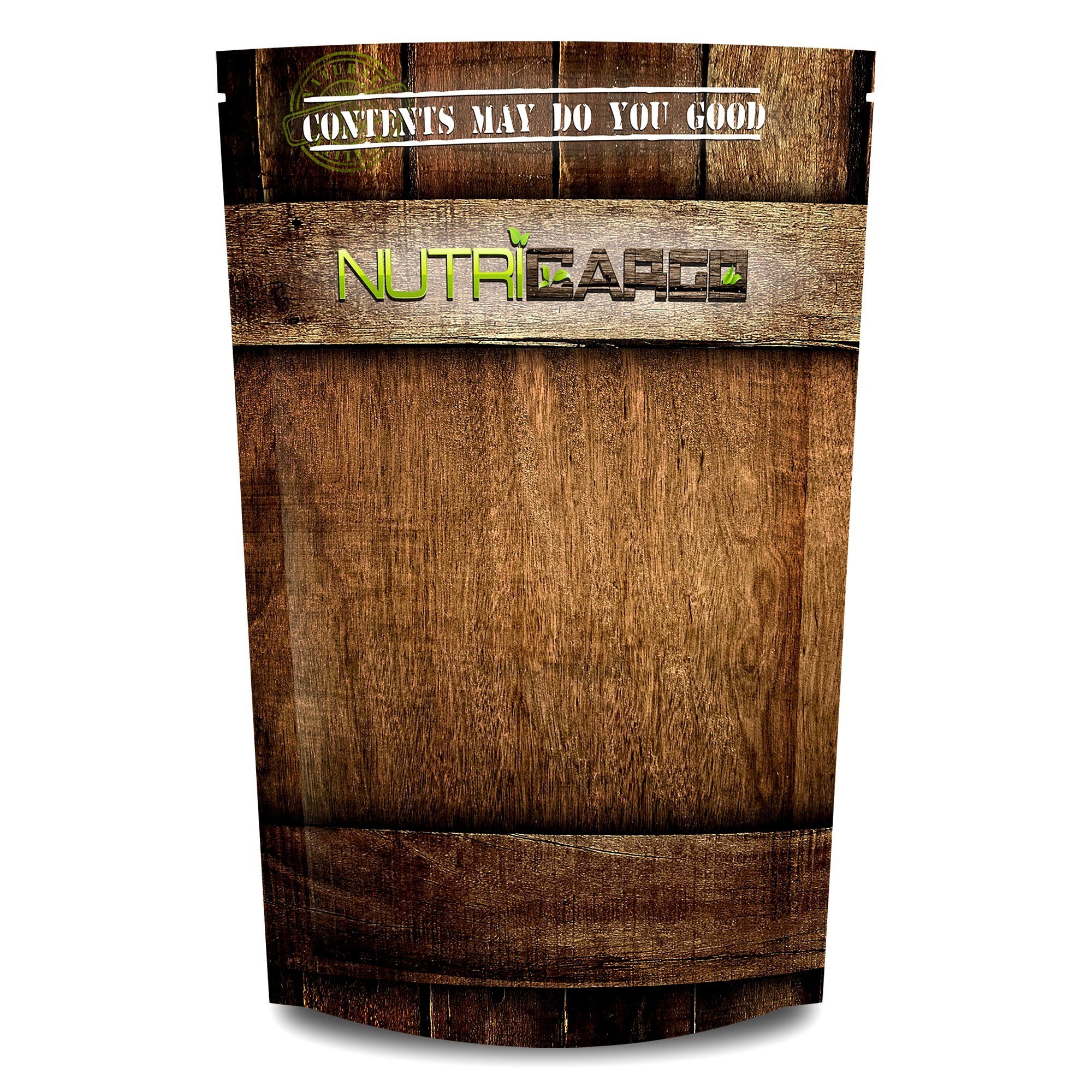
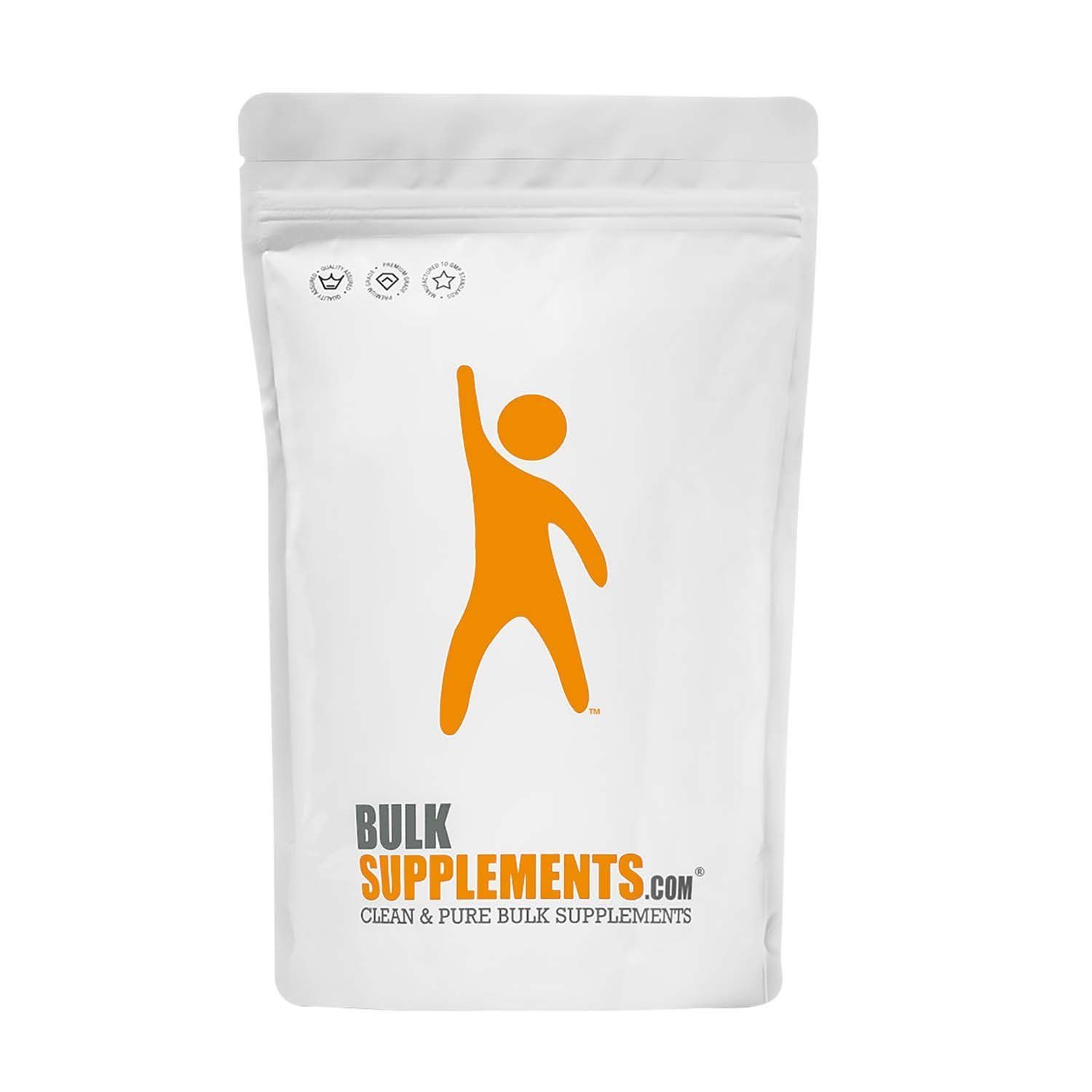
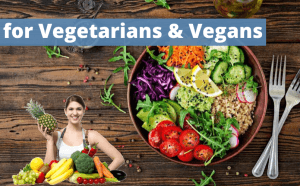 Vegans and Vegetarians
Vegans and Vegetarians